|
by Katja Swift This year at Herbstalk, I'll be talking about Herbs for Psychological and Emotional First Aid. Here, I want to share a somewhat different formula: herbs for people ASSISTING people who need psychological and emotional first aid! Whether you're responding to a local disaster or supporting a friend experiencing trauma or distress in their life, you need support too, especially if you're in it for the long haul. Here's a formula I love for just this type of work: Aid Worker’s Elixir ("keep going and keep it together") 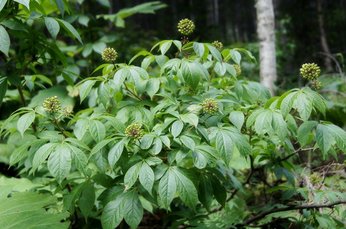 Eleuthero (Eleutherococcus senticosis) Eleuthero is an adaptogen, which means that it helps the body manage stress in a fairly generalized way. Recently, adaptogens are starting to be defined as herbs that have explicit action on the HPA axis or on the stress-response functions of the endocrine system as a whole. In other words - adaptogens can help you keep going. Eleuthero is stimulating, but it has a somewhat different quality than caffeine. You definitely get the uplifiting action, but it's not quite as much of a spike as caffeine can be, and it doesn't have the tendency to cause "jitters" or upset digestion. Eleuthero is fantastic when you need to keep working even in extreme conditions without enough resources - and in fact, that's how a lot of the studies on this plant were done! 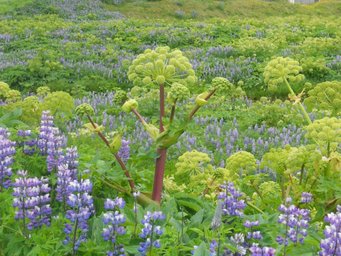 Angelica (Angelica archangelica) Angelica is a plant of extremes - it lives most happily up near the Arctic Circle, where it's either all day or all night. Even in the summer, though the sun is out 20+ hours a day, it's never really warm. Angelica is a tall plant with a large, heavy flower head, and yet it's stem is a strong spine that can support that weight even in forceful winds. Angelica can give you energy to last through extremes without losing your balance, and to support others even when you're feeling tossed about. 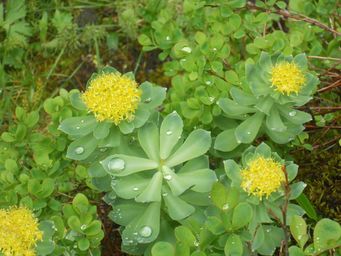 Rhodiola (Rhodiola rosea) Rhodiola is another Arctic Circle plant. It thrives on extreme rocky outcroppings and can hold things together. Often this plant is touted as an "anti-depressant", but traditionally it was thought of more as an endurance plant. Imagine Vikings rowing in open boats across cold seas - physically, that's a tremendous feat. When you can't see the shore (and might not for a few days), everything is grey and damp and cold, and you just have to keep moving without losing your internal compass: that's Rhodiola! 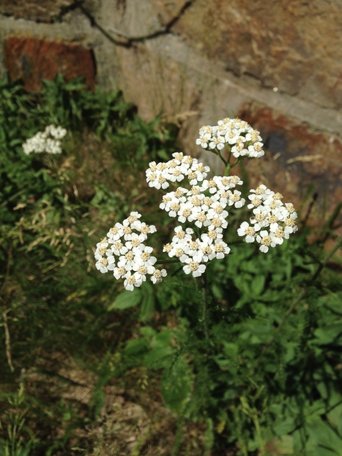 Yarrow (Achillea millefolium) Yarrow is a battlefield plant - traditionally it was an ally to wounded soldiers. And of course, with its strong ability to staunch bleeding, it's easy to see why. But the protective qualities of Yarrow were so strong that in naming the plant, botanists reference Achilles, who was protected (or "armored"!) against all harm except for the place on his heel where his mother held him to dip him into the magic river. Physiologically, we work with Yarrow for bleeding, and emotionally that can be true too - to prevent your own resources from bleeding out of you while you're supporting others. But the mythology behind Yarrow - though we haven't invented the microscope that can explain it yet - also plays a part: Yarrow is like "emotional armor". When you need to be strong in difficult situations, when you need to put on your armor and head out to the emotional battlefield, Yarrow has an amazing shielding quality. Blend a strong decoction or make a tincture of these plants in equal parts. I like to add something sweet – maple syrup would be my first choice, or molasses, because of the mineral content and nourishing aspect, though honey is also a good choice. Just like chocolate helps you recover from the emotional onslaught of the Dementors in the Harry Potter stories, there's something particularly magic about the ability of sweet things to feel soothing in difficult times! Consume freely as needed. And of course, once you and your community are safe, let yourself sleep for a week! This formula is fantastic whether you're working in a first aid tent after a natural disaster, supporting a loved one through hospice care, or even "just" supporting your teenager as they navigate the pits and falls of high school!  Katja has been teaching herbalism and practicing as a clinical herbalist since 1996. For ten years she owned and worked a 150-acre certified organic farm in central Vermont. During this time she taught monthly at the local coop, and as a guest lecturer at Dartmouth Medical School and the UVM Medical School. In 2011, she and her husband Ryn Midura founded the CommonWealth Center for Holistic Herbalism, a vitalist school with a three-year clinical training program. In addition to this program, they offer a one-year community herbalist program and community classes and workshops. Katja serves as adjunct faculty at MCPHS University and Northeastern University, teaching vitalism and Traditional Western Herbalism to 100 PharmD students each year. Katja is also trained as a street medic and Wilderness First Responder, and has run in the streets or coordinated dispatch for actions in Boston, New York, and Ferguson. Katja writes regularly for Plant Healer Magazine and the Journal of the Northeast Herbal Association, among others. She has presented at the Traditions in Western Herbalism conferences, the American Herbalists Guild symposium, IM4US, and Herbstalk. |
Archives
November 2023
Categories
All
|
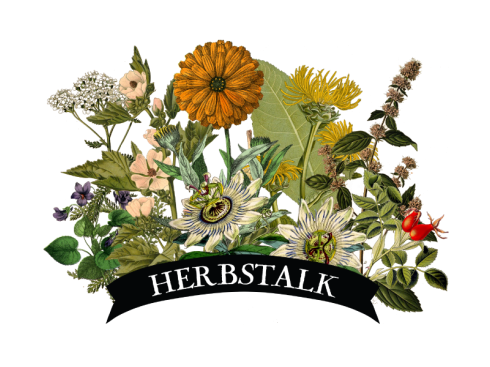
 RSS Feed
RSS Feed